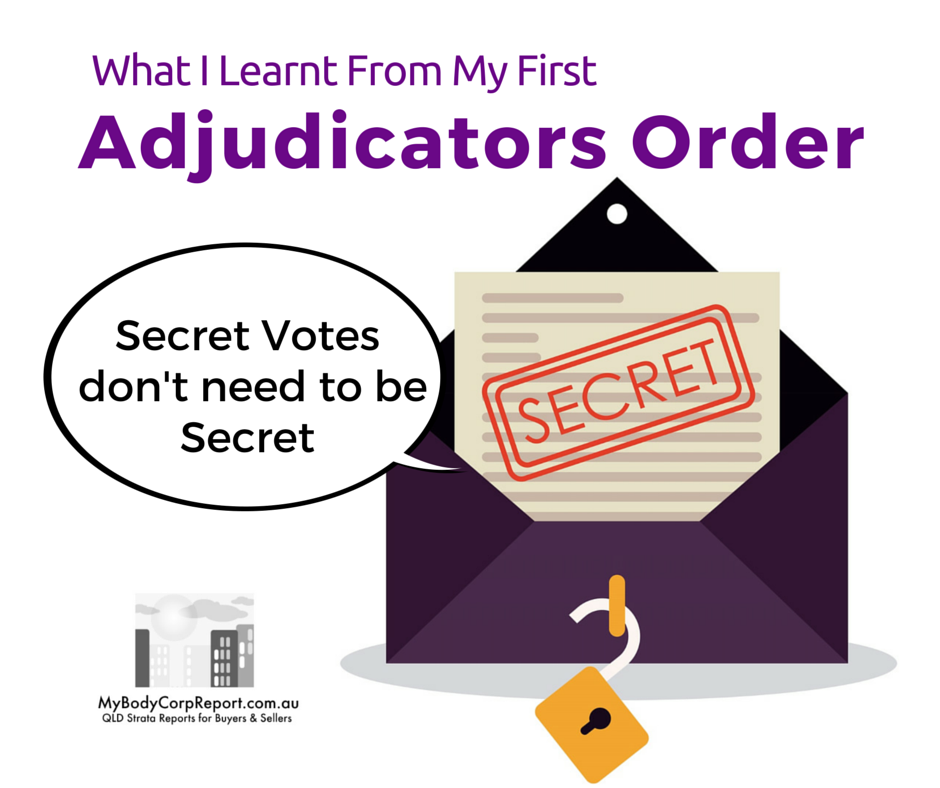I’ve just been involved in Adjudication. A ruling I made as a returning officer was disputed by a lot owner who made an application to the Commissioners Office to overturn. That application has now been decided.
Let me set the scene.
I’d been appointed returning officer for Florentino Apartments, a 20 lot body corporate on the Gold Coast registered under the Accommodation module.
The secret motion was to extend the term of the Caretaking and Letting Agreement by adding an option for renewal, pretty standard stuff.
That said, from the start it was clear this motion was hotly contested.
Of the total 20 lots in the body corporate 15 lot owners submitted secret votes. Given that a lot of schemes struggle to get a quorum for meetings the voter turnout for this motion was huge.
All 15 secret ballot envelopes were validated.
I opened the ballots and one vote had a large scrawled message in support of the Caretakers, diligently signed by the lot owner.
My heart sank when I saw it.
Secret ballots are … well secret. That is the point of jumping through all the confusing, expensive and time consuming hoops. By keeping the votes secret you can vote however you choose secure in the knowledge there’ll be no repercussions.
I count the votes and I’m even further dismayed; the vote with the lot owner identified is the deciding vote.
If I say the vote is valid the motion is passed. If I invalidate the vote the motion is lost.
What do I do?
Passing the motion is clearly the will of the majority.
But I’m not appointed to act for the majority, I’m appointed to act impartially for all the lot owners, regardless of how they voted, and frankly what do I care how the vote comes out? (Actually in this instance I cared quite a lot because the Caretakers were sitting two feet away waiting for my decision!)
My understanding of secret votes is that each person must vote secretly. That is the whole purpose of the convoluted process for making and validating the votes. The process has evolved to ensure that votes can be cast secretly whilst still maintaining the integrity of the voting process.
The lot owner in question identified themselves on the voting paper disregarding that premises and therefore the vote was not secret.
I chose to invalidate the vote.
I have to say it was horrible. That’s the worst thing about being a returning officer; in the moment you must make a decision. There’s no extra lives or phone a friend. Just decide. Right now.
I made a logical decision based on everything I’d learnt about the secret voting process (to date of course) and invalidated the vote.
I felt so bad about it I actually suggested to the Caretaker at the meeting that they make an Adjudicators Order, which subsequently they did.
Ironically, if I’d ruled the opposite way those who voted against the motion indicated they may have made an adjudication application as well. Sigh.
What the Adjudicator Said
Now of course I feel even worse because the Adjudicator ruled the vote should have been validated and the motion is deemed passed.
My error was in thinking that the purpose of all the rigmarole associated with secret voting was to maintain secrecy. The Adjudicator noted:
It is evident that the purpose of secret ballot process is to ensure that the identity of the voter is kept separate from the vote, so that the way each person has voted is not known. This ensures owners are free to vote as they choose, without risking repercussions. As such the system exists to protect the voter. Secrecy is the means to this end, and not the end itself.
The goal is to provide freedom for lot owners to vote how they choose. Secrecy is the tool, not the necessary outcome.
What that means is that if an owner decides to declare how they personally chose to vote, even if they choose to do that on the voting paper, it’s of no concern to anyone.
The option of secrecy is there for those who choose to utilise it.
Which all rather begs the question why do you have to go through the whole involved process in the first place, but that again is to give those who choose to keep their vote secret the option to do so.
There you go, nice and clear, secret votes don’t need to be secret.
Interestingly one of the other conclusions I’d made about the secret voting process was that it’s intended the vote on the subject is meant to be uninfluenced by other lot owners.
That’s not the case at all, in fact the Adjudicator noted owners are quite entitled to try and encourage others to vote a certain way on a motion.
Read the full Adjudicators Order here.
Conclusion
No one likes to hear “hey, you’re completely wrong”, it’s a somewhat character building moment.
That said I’m grateful for having the matter clarified. I cherish those instances where the answer to a question or set of circumstances is clearly defined. It makes things much easier.
One of my big takeaways from this process has been an understanding of how easy it is to have a flawed premise, and, although you may approach a situation with a desire to be fair to all parties involved that’s not the result achieved.
And I must say I much prefer my role of quiet investigator of body corporates rather than front and centre involvement on the main stage. A big hat tip to those who enjoy it.

